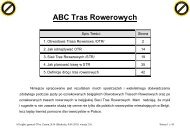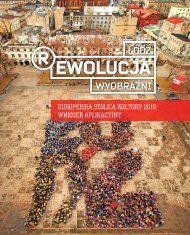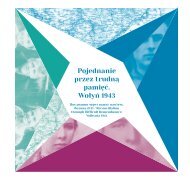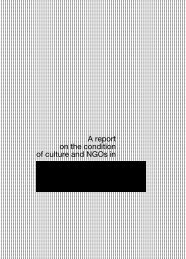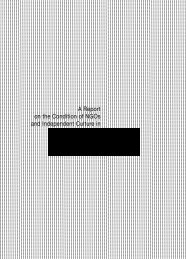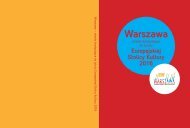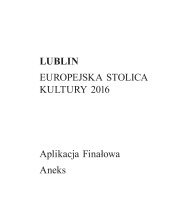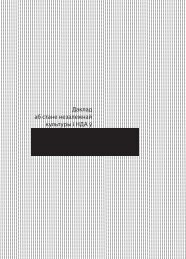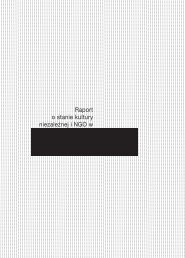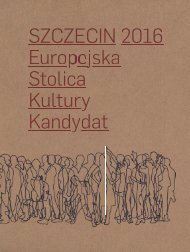Lublin 2016 â Appendix - Kultura Enter
Lublin 2016 â Appendix - Kultura Enter
Lublin 2016 â Appendix - Kultura Enter
You also want an ePaper? Increase the reach of your titles
YUMPU automatically turns print PDFs into web optimized ePapers that Google loves.
3.2 To broaden the “imported” offer - this objective focuses on the development of artistic management<br />
(impresariat), as well as opening up of all other cultural institutions to allow the exchange<br />
of artistic events and festivals. This goal is particularly important for the ECC <strong>2016</strong> celebration,<br />
but it is equally vital for the broadening of cultural competence (2.5) and for encouragement<br />
of external networking (4.5).<br />
3.3 To optimize the offer of the <strong>Lublin</strong> cultural institutions - this goal covers the need for upgrading<br />
and strengthening the character of the local offer complying with social expectations and<br />
capable of implementing the adopted vision and programming axes. The assessment of this offer<br />
- through an on-going debate led by the SPOKO, and in the analysis of the Cultural Observatory<br />
(Governance) - should help those institutions flexibly adapt their programs to current needs.<br />
Thanks to the socializing of cultural governance, more favourable conditions will be created for<br />
improved cooperation between cultural institutions, the building of complementary programs and<br />
the broadening of cultural contexts (cultural background) for their offers.<br />
3.4 To develop the offer of “involuntary” contact with arts - this objective covers events and exhibitions<br />
held in public spaces, commercial facilities and centres, offices, hospitals, schools and other<br />
places open to various “clientèle”; their aim will be to slip in artistic impressions among other types<br />
of activities.<br />
3.5 To expand and improve recreational and sports offer- seen as an essential supplement to cultural<br />
action; promoting physical activity as vital for a healthy lifestyle. It is important that this offer<br />
is tailored to the recipients’ capabilities in terms of age, physical condition and preferences. It<br />
should also open up the opportunity for social integration and contact with arts (3.4).<br />
3.6 To develop the outdoor offer - located in public and green areas (1.5); it is of key importance for<br />
the use and exposure of city’s spatial features and promotion of an active lifestyle. It is not enough<br />
for <strong>Lublin</strong> surrounded by landscape and national parks to merely provide well cared-for green<br />
spots; more importantly, such places should be filled with visual art, events and attractions encouraging<br />
outdoor leisure within the city boundaries.<br />
3.7 To develop an offer for foreigners - available in foreign languages and respecting distinct cultural<br />
codes. This offer will be intended for foreign students (currently about 3,000 people), immigrants<br />
(also from the refugee centre), foreign tourists and foreign business people. Their opinion<br />
about <strong>Lublin</strong> influences the city’s image worldwide. This offer will also be a preliminary step in<br />
the integration of immigrants.<br />
Cultural Development<br />
Strategy<br />
4. Availability of culture<br />
means favourable conditions for participation in culture, both in time and space, also owing to wise<br />
organization (Participation and Governance).<br />
The operational objectives set out in this area are:<br />
4.1 To develop a network of “first contact” cultural establishments - this objective aims to maintain<br />
the existing small district community centres and libraries and broaden their offer (3.1); at<br />
the same time, this network should grow to include new establishments or sites, so that ultimately<br />
such cultural locations were no farther than within a walking distance (15 minutes) for any resident.<br />
Their opening hours should take account of the daily and weekly rhythm of the local community.<br />
This network should be further built up by locations occupied by NGOs involved in cultural<br />
activity (5.7).<br />
4.2 To build a “system of cultural logistics” - an indispensable tool in view of the expanding cultural<br />
offer; this system will collect and distribute information on cultural events; it will enable<br />
event synchronization and timing and will be an ample resource for publications of event schedules<br />
and calendars - all aligned with the audiences’ needs and preferences. Information - up-to-date<br />
80



